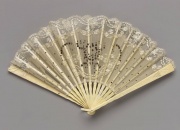Difference between revisions of "Imitation ivory"
m (Text replace - "== Authority ==" to "== Sources Checked for Data in Record ==") |
|||
| Line 12: | Line 12: | ||
176 J.Thornton,"The Structure of Ivory and Ivory Substitutes", AIC Preprints, Philadelphia, 1981, p.173-181 | 176 J.Thornton,"The Structure of Ivory and Ivory Substitutes", AIC Preprints, Philadelphia, 1981, p.173-181 | ||
| − | == | + | == Sources Checked for Data in Record == |
* Thomas Gregory, ''The Condensed Chemical Dictionary'', Reinhold Publishing, New York, 3rd ed., 1942 | * Thomas Gregory, ''The Condensed Chemical Dictionary'', Reinhold Publishing, New York, 3rd ed., 1942 | ||
Revision as of 06:34, 1 May 2016
Description
Many types of horns, antlers, and bones are used to imitate Ivory. Examples are Hippopotamus teeth, Sperm whale teeth, Walrus tusk, Narwhal tusk, rhinoceros horn, and Deer antler. Vegetable products such as palm nuts, have been used as ivory substitutes. Imitation ivory has also been made by consolidating powdered bone and ivory with protein binders such as Glue or Casein. Other mixtures include Shellac filled with Chalk and Clay. Synthetic resins, such as Cellulose nitrate, were specifically developed as replacements for ivory. Some cellulose nitrate imitations were even made as laminates to imitate the layered structure of ivory.
Synonyms and Related Terms
artificial ivory; ivoire artificiel (Fr.); ivory substitute
Additional Information
176 J.Thornton,"The Structure of Ivory and Ivory Substitutes", AIC Preprints, Philadelphia, 1981, p.173-181
Sources Checked for Data in Record
- Thomas Gregory, The Condensed Chemical Dictionary, Reinhold Publishing, New York, 3rd ed., 1942
- Hermann Kuhn, Conservation and Restoration of Works of Art and Antiquities, Butterworths, London, 1986
- Art and Architecture Thesaurus Online, http://www.getty.edu/research/tools/vocabulary/aat/, J. Paul Getty Trust, Los Angeles, 2000
